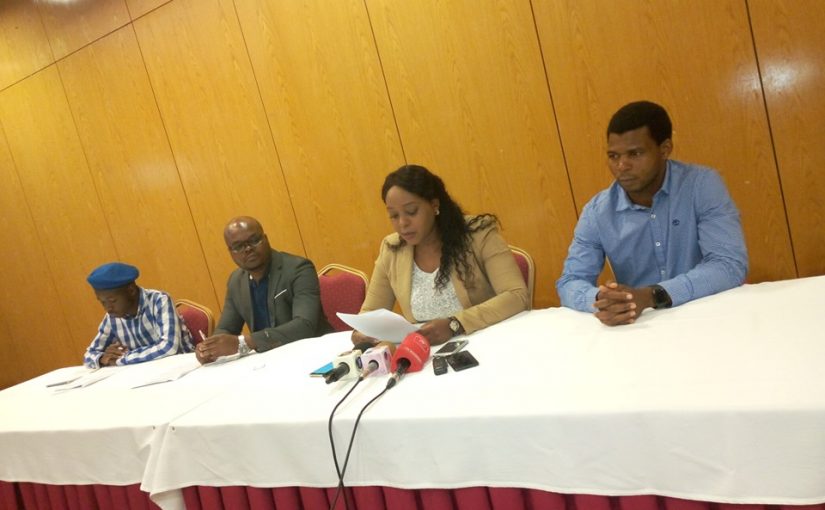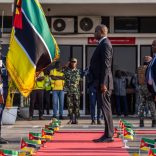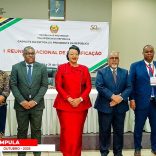Mozambique: President Chapo leaves for a working visit to Algeria
Civil society bodies demand apology from STAE

Photo: Sala da Paz
Several prominent Mozambican civil society organisations on Thursday demanded that Felisberto Naife, the general director of the Electoral Administration Technical Secretariat (STAE), apologise for his claim that civil society bodies were not prepared to observe the voter registration that took place between 15 April and 30 May.
Naife made the claim in an interview published by the daily paper “Noticias” on 18 June, but he provided no evidence and so the organisations demanded a public apology.
At a Maputo press conference, the organisations, which include the main anti-corruption NGO, the Centre for Public Integrity (CIP), the Forum of Community Radios (FORCOM), and the coalition of bodies defending women’s rights, known as the Women’s Forum, pointed out that, in reality it was the electoral bodies, and not civil society that was disorganised and unprepared.
This was shown most shockingly by the failure of STAE and the National Elections Commission (CNE) to provide accreditation for 650 civil society observers. The STAE disorganisation was particularly clear in Nampula, Sofala, Tete and Zambezia province.
This was due partly to the CNE’s delay in sending to the provinces the model of observer credentials to be used, and partly to the shortage of human and material resources in the STAE provincial delegations.
Much worse was the demand that observers provide documents that are not mentioned in the legislation governing election observation.
Despite these unfavourable circumstances, the civil society observers performed their duties to the best of their abilities, and found some very worrying phenomena. Some of the over 7,000 voter registration posts only opened towards the very end of the registration, and here were even some that never opened at all.
There were constant breakdowns of the computerised registration equipment (known as “Mobile Ids”), and the statement from the observers noted that this happened particularly in areas where the opposition parties were believed to be influential. The STAE staff were unable to respond to the constant breakdowns.
The observers found that the numbers of voters registered were deliberately inflated in Gaza and Cabo Delgado provinces. (This was flagrant in Gaza, where the true size of the electorate, based on the figures from the 2017 population census, cannot possibly be more than 750,000, but STAE claims that 1,166,011 voters registered in this province).
The organisations noted that the problems with the registration led to the exclusion of a significant number of potential voters. It also distorted the distribution of parliamentary seats, which is supposed to be done in proportion to the number of registered voters in each province. The inflated figure for the Gaza electorate meant that too many seats were allocated to Gaza, and too few to Nampula and Zambezia.
The statement notes that some of the irregularities noted by the civil society observers were corrected by the CNE and STAE, but others “were simply ignored”. Nonetheless, the experience showed that civil society bodies now had more capacity than ever before to monitor voter registration.
The statement stressed that independent observation by civil society bodies “plays an important role in that it strengthens the trust of citizens in the election procedures, dissuades possible attempts at fraud, exposes irregularities and makes it possible to correct them, and gives citizens relevant information about the integrity of the elections”.
The civil society bodies called for a detailed report from the CNE and STAE on the problems found during the registration and how they were solved – such as how many Mobile IDs broke down and how many were repaired. This was not too much to demand from bodies which are paid for by Mozambican taxpayers, but then did a poor job – and, to make matters worse, ridiculed the work of others.
The organisations also wanted details of how many attempts were discovered of people trying to register more than once, and how many foreigners and how many people under the age of 18 were caught registering. What guarantees, if any, are here that the final registration numbers do not include any children or foreigners?
That some aspects of the registration went seriously wrong is clear from an item in Thursday’s issue of “Noticias”, stating that the police in Nampula city have arrested a man found in possession of no fewer than 200 of the voter cards printed by the registration brigades.
This man also had a credential issued by one of the minor political parties, the Alternative Movement of Mozambique (MAMO), which is a breakaway from the Mozambique Democratic Movement (MDM). The police say they are still investigating the case.
ALSO READ: Mozambique: Civil society was not prepared to observe voter registration, says STAE director general
ALSO READ: Mozambique: Registration hits 90%, but who took Gaza’s children? – By Joseph Hanlon












Leave a Reply
Be the First to Comment!
You must be logged in to post a comment.
You must be logged in to post a comment.